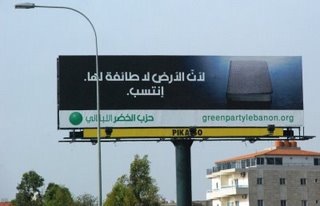Hillary Clinton in Lebanon
So Hillary Clinton made a surprise visit to Lebanon, where she called for elections to be free and fair, and without external interference.
I hate to venture into the minefield of Lebanese politics, but it strikes me that elections there are relatively free, in the sense that the state does not rig them, dispatch police to prevent people from voting, or engage in campaigns of intimidation against opposition candidates. This is not the issue in Lebanon since after all there is barely a state there. (With the caveat, of course, that Syria still runs campaigns of destabilization against those politicians that oppose its lingering influence. But this is a wider problem, not per se an electoral issue.)
The problem with Lebanon's electoral system lies more in that it is organized on sectarian lines (as the whole political system is), involves rampant vote-buying, and generally offers little in the way of surprise since the parties and confessional groups have an interest in coming to some sort of consensus on their outcome. Indeed, although seats are distributed by confession, some kind of cross-confessional alliance is needed to win individual seats (i.e. candidates have to reach beyond their community), which creates the shifting alliances of the Lebanese political system.
So in the context of what's expected to be a narrow victory for Hizbullah and its allies that will return the same kind of national unity government that already exists, Clinton's statements is more of a partisan cry of support for March 14 and a signal to March 8 that the US is watching. But let's not turn this into an issue of elections being fair or unfair, especially in an electoral system designed to reproduce, give or take, the status-quo of the Taif Accords. Everyone knows what the system is - friend of Hillary Clinton or not.
Now, ignore everything said above and go read much more informed people blogging about the Lebanese elections here. He (or she) says there are only 18 seats (out of 128) that are really up for grabs, the rest being evenly divided between March 8 and March 14.
Personally, if I could vote, I'd go for these guys:

The Green Party: "Because the Earth is not confessional."
In the meantime, the Lebanese economy enjoyed 9% growth last year.
P.S. Also read this on the video circulating showing Walid Jumblatt disparaging his March 14 partners and urging reconciliation with Shias, which Michael Young thinks may signal a future change of sides for the Druze weathervane.
I hate to venture into the minefield of Lebanese politics, but it strikes me that elections there are relatively free, in the sense that the state does not rig them, dispatch police to prevent people from voting, or engage in campaigns of intimidation against opposition candidates. This is not the issue in Lebanon since after all there is barely a state there. (With the caveat, of course, that Syria still runs campaigns of destabilization against those politicians that oppose its lingering influence. But this is a wider problem, not per se an electoral issue.)
The problem with Lebanon's electoral system lies more in that it is organized on sectarian lines (as the whole political system is), involves rampant vote-buying, and generally offers little in the way of surprise since the parties and confessional groups have an interest in coming to some sort of consensus on their outcome. Indeed, although seats are distributed by confession, some kind of cross-confessional alliance is needed to win individual seats (i.e. candidates have to reach beyond their community), which creates the shifting alliances of the Lebanese political system.
So in the context of what's expected to be a narrow victory for Hizbullah and its allies that will return the same kind of national unity government that already exists, Clinton's statements is more of a partisan cry of support for March 14 and a signal to March 8 that the US is watching. But let's not turn this into an issue of elections being fair or unfair, especially in an electoral system designed to reproduce, give or take, the status-quo of the Taif Accords. Everyone knows what the system is - friend of Hillary Clinton or not.
Now, ignore everything said above and go read much more informed people blogging about the Lebanese elections here. He (or she) says there are only 18 seats (out of 128) that are really up for grabs, the rest being evenly divided between March 8 and March 14.
Personally, if I could vote, I'd go for these guys:

The Green Party: "Because the Earth is not confessional."
In the meantime, the Lebanese economy enjoyed 9% growth last year.
P.S. Also read this on the video circulating showing Walid Jumblatt disparaging his March 14 partners and urging reconciliation with Shias, which Michael Young thinks may signal a future change of sides for the Druze weathervane.
